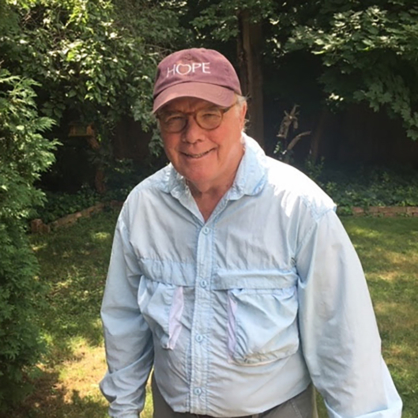My Patient Saved My Life

In October 2010, while on vacation with my wife, I started experiencing night sweats. Upon our return home to Albany, NY, I saw my primary care physician and underwent tests to uncover the cause of these night sweats and the reason for the high white blood cell count my doctor discovered. However, I didn’t consider pancreatic cancer until a chance conversation with one of my ophthalmology patients. She mentioned her sister had just been diagnosed with the disease after presenting with very vague symptoms. Something about our conversation unnerved me, and I asked my doctor to order a CAT scan of my pancreas.
It turns out my patient’s visit literally saved my life.
I was shocked and shattered when I learned I had a six-centimeter tumor in the distal part of my pancreas and cancerous lesions in my liver. At 70 years old and despite being physically active and having no family history of the disease, I joined the thousands of other Americans facing a pancreatic cancer diagnosis. In that surreal moment, my entire life permanently changed.
Immediately, I visited a local pancreatic cancer specialist who wasn’t optimistic about my chances for survival. He referred me for a biopsy, which revealed I had the most malignant form of pancreatic cancer. Reeling from these results, I met with a pancreatic surgeon who performed a laparoscopy in the operating room and closed me up. He informed my family my condition was inoperable. A grueling chemotherapy regimen might give me six months to live. His advice was to leave me be and let me go somewhat comfortably in three months.
A Second Chance
Completely devastated, I sought a second opinion at Memorial Sloan Kettering Cancer Center in New York City and, unfortunately, the surgeon agreed my cancer was inoperable. I returned to Albany, discouraged but willing to fight because my family needed me. I met with another oncologist, who prescribed chemotherapy treatments every other week, where I would go home after the initial dose and a nurse would then hook me up to an additional chemotherapy drip for two days.
Shortly after treatment began, my white blood cell count was so depleted I ended up in the emergency room. I experienced multiple side effects from the chemotherapy, including sores all over my body, nausea and constant hiccups. At one point, I lost over 30 pounds. I focused on following a nutritious diet to maintain my weight despite the chemotherapy treatments ravaging my body. I found keeping my weight up helped me regain some stamina and strength. Every night, my wife and I would watch cooking shows together, hoping the mouth-watering recipes would get me excited about eating again.
Through a positive attitude, the constant support of my family and friends, and the power of prayer, I managed to endure this treatment regimen for around five months. I was terrified to receive the results of my post-treatment scan because I didn’t know how I would continue the difficult regimen if my tumor had grown. As I sat anxiously in my oncologist’s waiting room, he walked down the hallway to another patient’s room and paused to give me a thumbs-up, and for the first time in months, I felt something good was happening for a change.
Glass Half Full
My scan results showed my pancreatic tumor shrank from six to two centimeters, with no new lesions! Even my oncologist was surprised by these significant results and encouraged me to consult another surgeon at Memorial Sloan Kettering Cancer Center. The surgeon told me what I’d heard before: he would attempt to operate but couldn’t promise the procedure would be successful.
The surgeon asked if I was a glass-half-full or a glass-half-empty person; I’m an optimist by nature and chose to focus positive energy on having the surgery completed this time. During my surgery, my doctor removed the entire tumor, my spleen, a portion of my stomach and some lymph nodes and killed my liver lesions using cryoablation, or extreme cold. Afterward, as a precautionary measure, I underwent two months of a more bearable chemotherapy treatment. After this therapy, my CAT scan showed no evidence of disease, and hearing this news was one of the happiest moments of my life.
Don’t Sweat the Small Stuff
I discovered the Lustgarten Foundation when my daughter participated in the Albany Pancreatic Cancer Research Walk, and I now wear my Lustgarten HOPE hat with pride! The research the Lustgarten Foundation is conducting is so critical because if we can predict who is at an increased risk, and if we have more treatment options available, then we can save more lives and create more hope.
This experience has taught me to not get upset about small things and to have a more relaxed, more spiritual outlook on life. Now, 10 years after my initial diagnosis, all my blood work continues to be within a normal range, and I am more attuned to my body, should any symptoms arise again.
My wife and I were blessed to celebrate 57 years of marriage in 2020 and to enjoy our wonderful family, including our 10 incredible grandchildren. I recently turned 80, and as a birthday present, my port was finally removed. I can’t imagine a better milestone to celebrate!

